News story
UN Youth Champions for Disarmament gather insights and recommendations among young leaders in virtual Regional Youth Forum
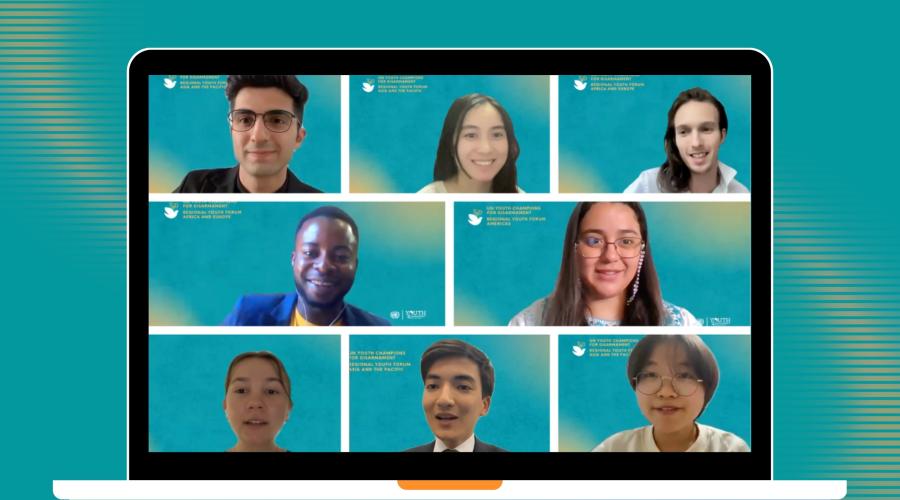
On 15 July, in celebration of World Youth Skills Day, the United Nations Office for Disarmament Affairs (UNODA) hosted the Regional Youth Forum, which included 3 different regional sessions with youth from Asia and the Pacific, Africa and Europe, and the Americas. Throughout the event, the UN Youth Champions for Disarmament (YC4D) presented their regional priorities for disarmament and their projects to engage local communities on issues, before gathering insights and recommendations from participants to be collated and presented at the UN General Assembly’s First Committee in October 2024.
Live interpretation in French and Spanish was provided for the two sessions held for Africa and Europe, and the Americas respectively, ensuring accessibility for as many young people as possible to participate and express their thoughts in their native languages.
YC4D: Empowering Youth for Disarmament
Launched in October 2023 with generous financial support from the Government of Germany, the UN Youth Champions for Disarmament Training Programme aims to empower young people to advocate for disarmament in their communities. Out of over 1,000 applicants from 128 countries, 15 exceptional young leaders were selected. The Youth Champions have been participating in online courses and expert-led webinars to learn about disarmament, non-proliferation, and arms control, and their connection to the 2030 Agenda for Sustainable Development. At the regional youth forum, the Youth Champions for Disarmament utilized the knowledge acquired over the past months to lead the discussion with other young leaders to find solutions to advance disarmament objectives in their regions.
Ms. Radha Day, Chief of the Regional Disarmament, Information and Outreach Branch of UNODA, officially opened the forum, encouraging participants to be bold, focus on regional dynamics, and collaborate on solutions.
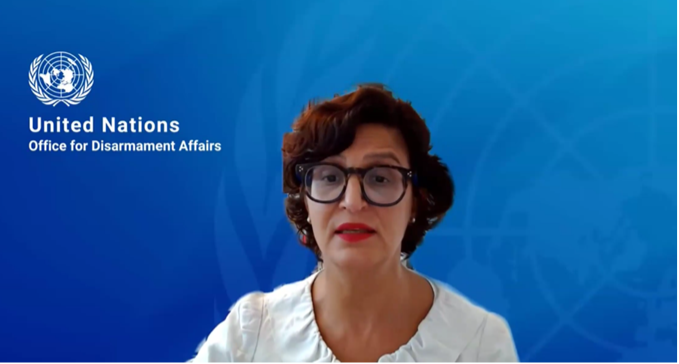
Asia-Pacific Session
Kicking-off the six-hour webathon, the Asia-Pacific session saw young participants in a dynamic and interactive discussion on key disarmament issues. Moderated by Mr. Boyi Zhang, Junior Project Advisor for Youth and Disarmament at the Regional Centre for Peace and Disarmament in Asia and the Pacific (UNRCPD), the session provided a platform for young people to express their views. He began the session with ice-breaker questions to foster a comfortable environment and laying the ground for an interactive discussion between the participants and the YC4D.
Mr. Aaron Junhoung Yoo, Deputy Director of UNRCPD, welcomed participants, setting a regional context for the discussions. He noted “our region faces a lot of complex disarmament issues that require innovative and collaborative approaches. It is through forums like this that we can unravel those complexities and work towards a more sustainable solution.”
After that, three UN Youth Champions for Disarmament, Mr. Nurullo Rasulov, Ms. Charlotte Yeung, and Ms. Sangeun Noh, showcased the design of their individual projects, which they had been working on as part of the global Youth Champions for Disarmament Programme. The projects are meant for the Youth Champions to think of ways to engage their local communities and put their knowledge into action. Participants were asked to provide feedback and encouraged to design their own projects for their respective communities.
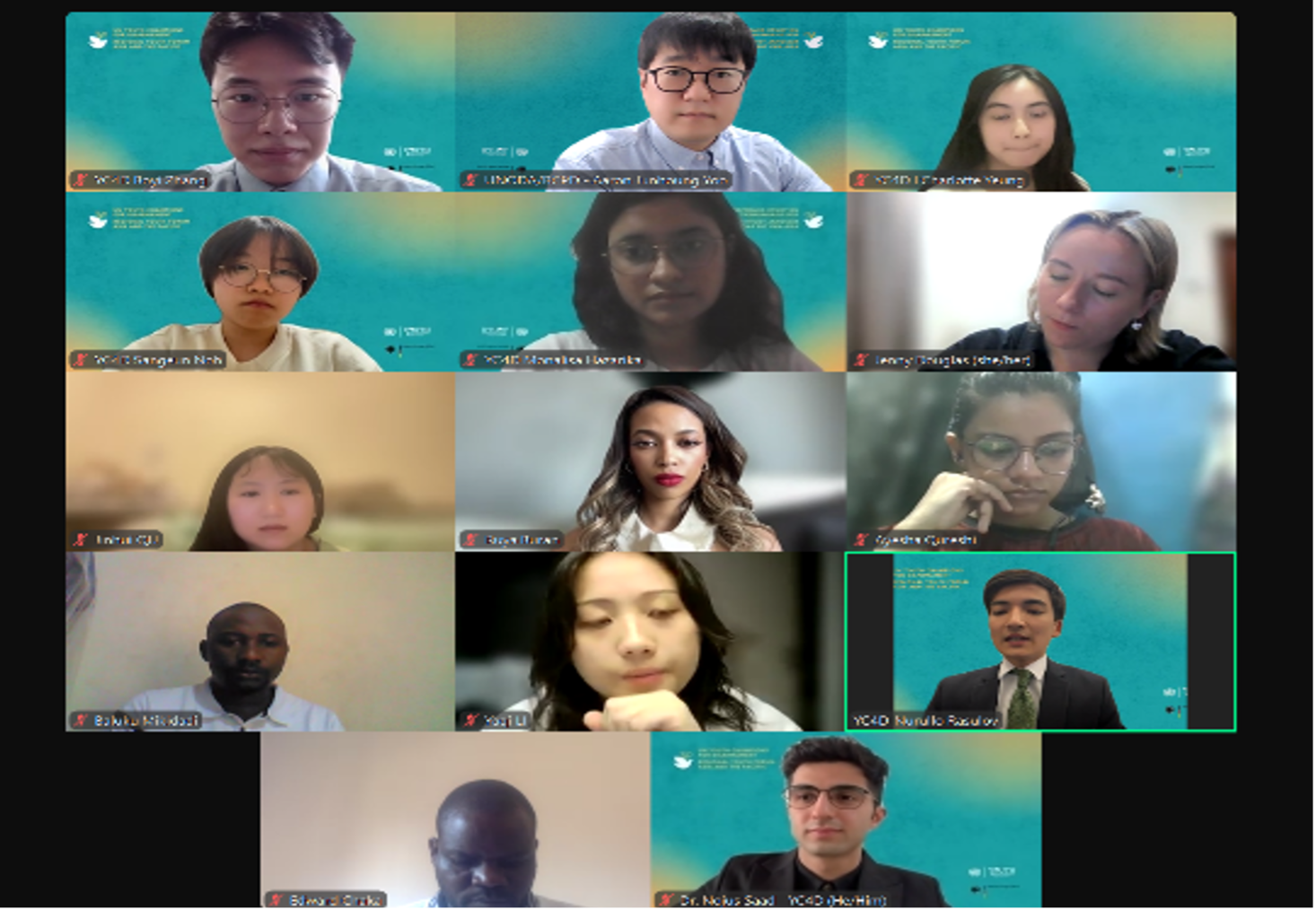
The session then shifted focus to regional disarmament priorities from a youth perspective. Youth Champions Ms. Monalisa Hazarika and Dr. Nojus Saad discussed disarmament challenges in their subregions, South Asia and the Middle East, while Mr. Safayet Zamil Nowshan presented on linking disarmament and human rights. Mr. Boyi Zhang introduced upcoming opportunities such as the N.O.N.E. Campaign and the Disarmament Education Dashboard.
Africa and Europe Session
Passing the baton, the second session began with an interactive poll for young people from Africa and Europe to share their thoughts on the most pressing disarmament issues in the region. Moderated by Ms. Marykate Monaghan, Junior Project Advisor for Youth and Disarmament, the session provided an opportunity for youth to network and discuss key approaches to advance disarmament in relation to regional challenges.
Mr. Anselme Yabouri, Director of the United Nations Regional Centre for Peace and Disarmament in Africa (UNREC), noted the importance of educational and empowerment programmes to help young people reach their potential as agents of change in his opening remarks. Reflecting on UNODA’s work to ensure meaningful youth engagement, he noted that “the involvement of young people in our approaches is not simply a question of inclusion. It is essential for creating peaceful and sustainable societies.”
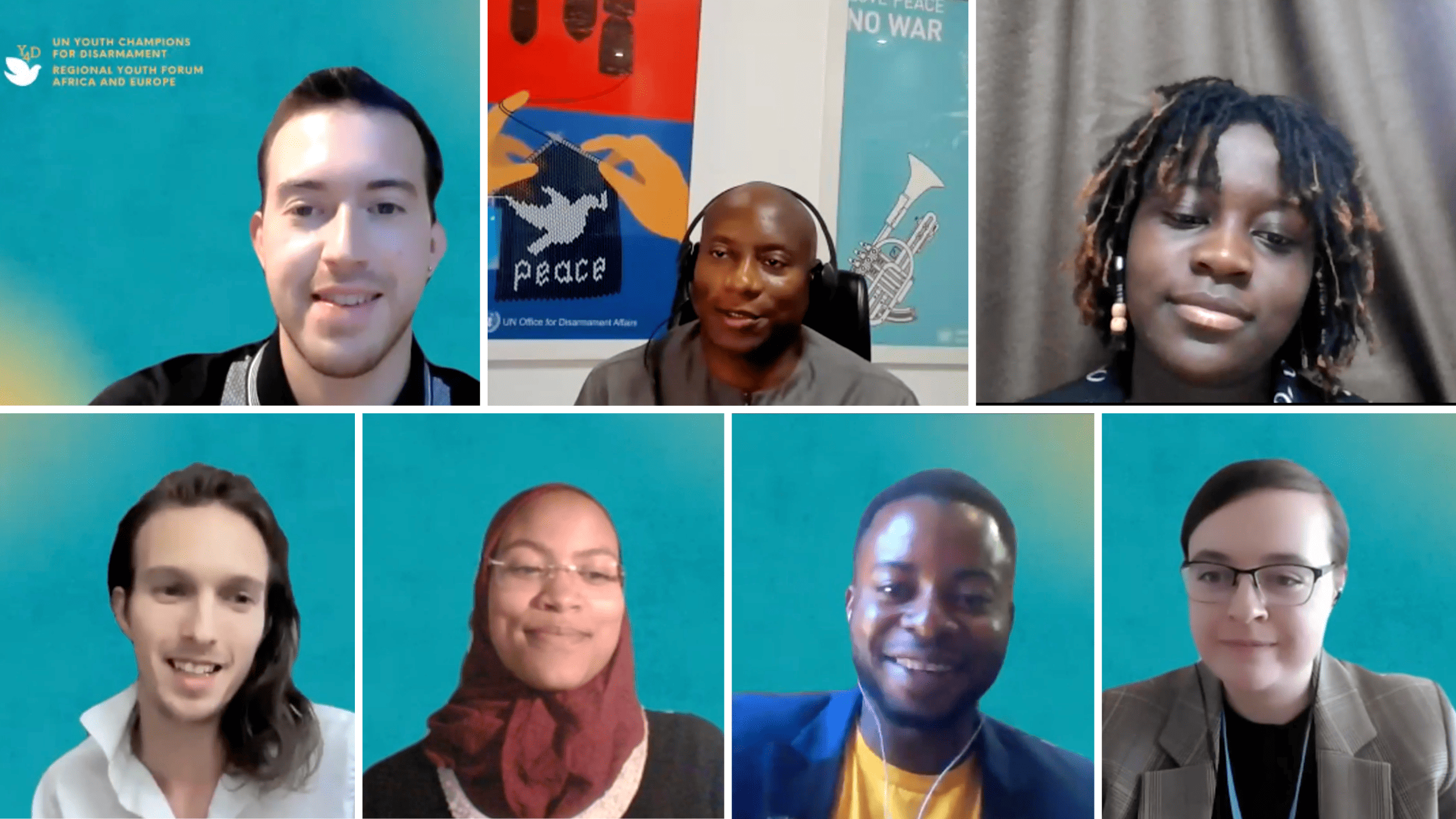
All five of the UN Youth Champions for Disarmament from Africa and Europe - Mr. Jutomue Doetein, Ms. Divina Maloum, Mr. Mihajlo Matković, Mr. Ivan Siluianov and Ms. Roberta Bojang - shared their regional priorities before introducing their unique projects to engage their local communities, ranging from workshops, art exhibitions and dance performances.
Americas Session
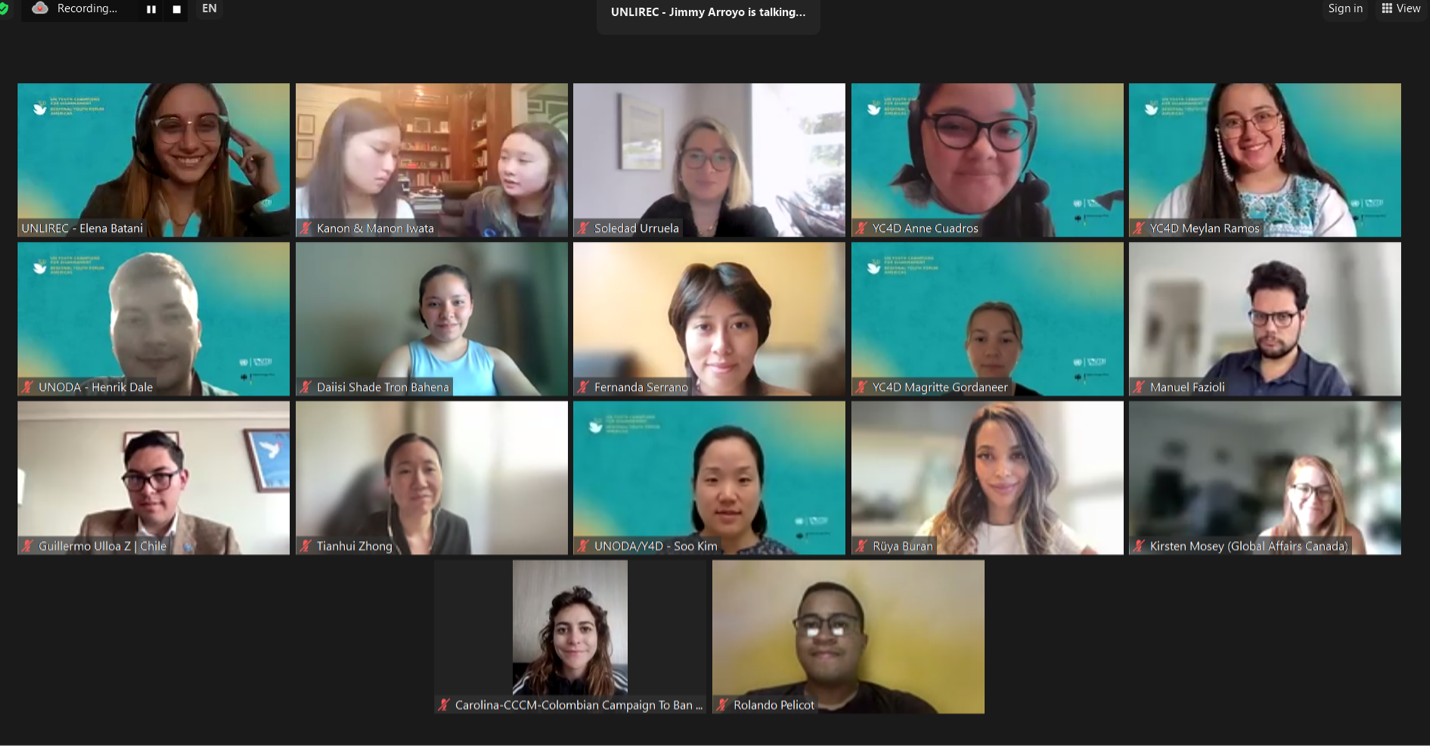
The Americas segment closed the event, concluding the disarmament around-the-world tour with a focus on the disarmament priorities of four subregions: North America, Central America, the Caribbean, and South America. The event was moderated by Ms. Elena Batani, Junior Project Advisor for Youth and Disarmament, at the UN Regional Centre for Peace, Disarmament and Development in Latin America and the Caribbean (UNLIREC).
Ms. Soledad Urruela, UNLIREC’s director, welcomed the participants and spotlighted the importance of youth participation in disarmament discussions: “Youth participation is essential to understand how weapons impact new generations both at a macro and micro level: at the level of cities, neighborhoods, communities. It is also essential to build new dynamics and synergies, for young people always bring innovative projects and refreshing ideas to the table.” Her speech set the scene for the core of the session: the presentations of the Youth Champions for Disarmament from the Americas region.
Ms. Anne Cuadros, from Peru, focused her intervention on the importance for South America of the recent discussions held at UN headquarters to counter illicit arms trafficking -in the framework of the Review Conference of the Programme of Action on Small Arms and Light Weapons-and on her advocacy role as a young woman from Latin America. Mr. Kobe Sandy, a national of Trinidad and Tobago, also focused on the impact small arms have on youth in Caribbean islands. Ms. Meylan Ramos, from Mexico, echoed his analysis, underlining how important it is to promote mental health to prevent armed violence and support victims. From her side, Ms. Magritte Gordaneer, from Canada, shared with the young participants strategies on how to build meaningful disarmament actions. She gave the example of the project she is developing in the framework of the Youth Champions for Disarmament programme, inviting young people to play an active role in preserving and advocating the stories of those affected by nuclear weapons testing in the United States.
Conclusion
Each segment ended with breakout rooms discussions facilitated by the Youth Champions for Disarmament. Participants discussed in small groups, allowing more interactions and speaking opportunities. The Youth Champions for Disarmament received feedback from participants on their projects and discussed ways to engage other young people on topics through awareness-raising activities and capacity-building opportunities.
Participants in the Asia and Pacific session pointed out issues such as the importance of strengthening disarmament education, how we should make more use of digital platforms to raise awareness among young people, and ways to enhance meaningful youth engagement in the field. In Africa and Europe, attendants also noted the need to address financial and logistical issues to ensure as many youth voices can be included in discussions, as well as the value of education to engage other young people from the region. In the Americas, young participants highlighted the importance of connecting disarmament with other pressing issues to encourage communities' participation.
Inputs and recommendations gathered during the breakout rooms discussions will be reflected in a publication to be presented during the First Committee. The regional youth forum helped underline the challenges faced by young people and the potential of youth participation when grounded in local contexts.
Findings from the Regional Youth Forum will support the UN Youth Champions for Disarmament to fine-tune and successfully implement their projects with local communities, as well as provide insights and recommendations from participants to be presented during the group’s study trip on the margins of the First Committee of the UN General Assembly later this year in October.